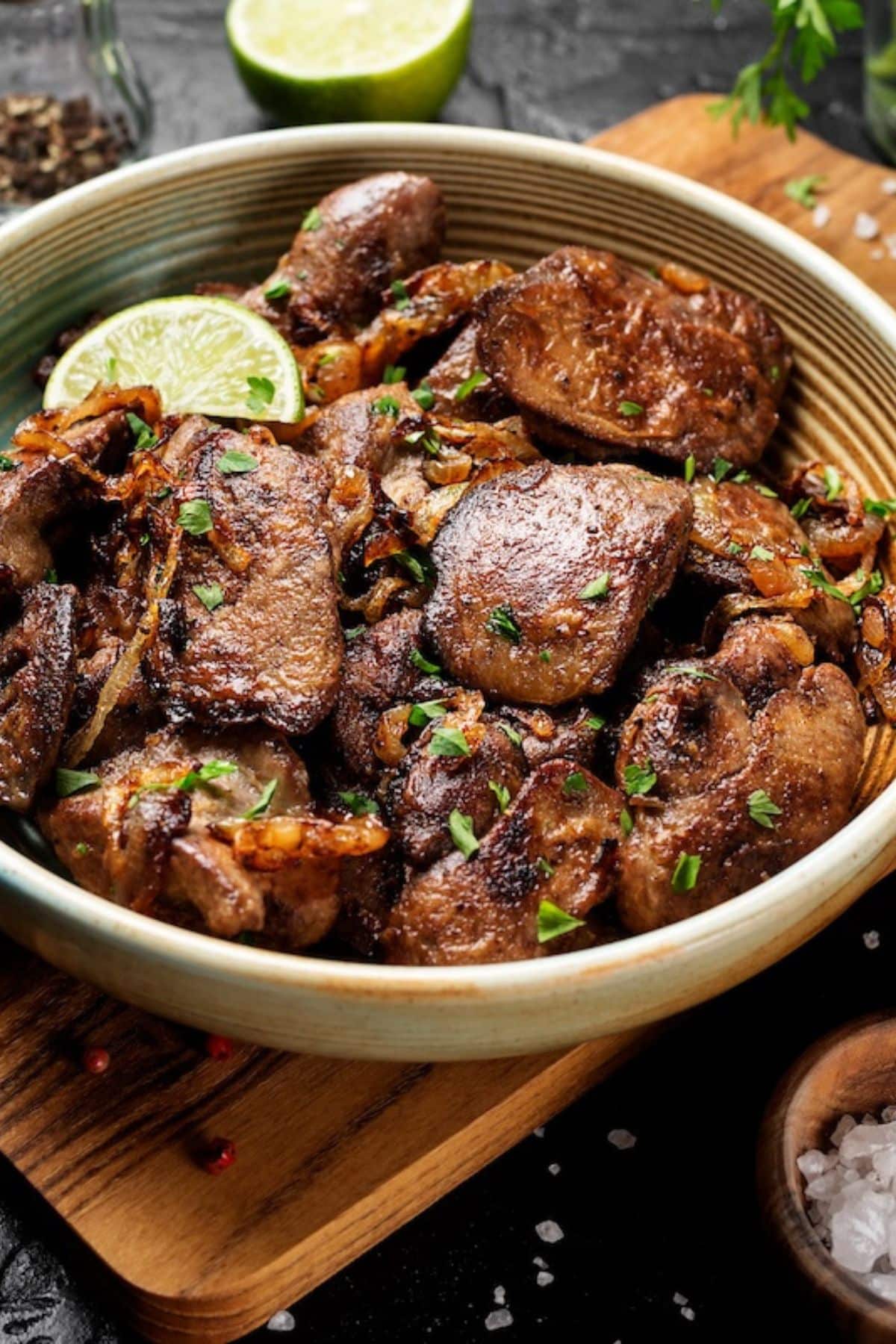Is Chicken Liver Healthy (Nutrition Pros and Cons)?
In this blog post, I’ll review the question of whether chicken liver is healthy or not. Find out what the nutrition pros and cons of this food are, along with some ideas on how to prepare it. For most people, consuming chicken liver is healthy.

Chicken Liver Facts
Packed with essential nutrients, vitamins and minerals, chicken liver is an affordable and versatile organ meat. Organ meats like animal liver offer different nutritional value from muscle meats such as chicken breast.
It has a soft, creamy texture (when cooked correctly), and a strong, earthy flavor.
It is used in cuisines throughout the world, from pâtés and pasta fillings in Europe to congee and curries in Asia. In Latin America, you’ll sometimes find it in empanadas, whereas in the United States, it is most often enjoyed by sautéing in olive oil or by breading, frying, and serving it with gravy.
Chicken liver has a very rich, distinctive flavor that pairs well with ingredients like onions and garlic, or with acidic ingredients like lemon juice that help counterbalance its strong taste.
If you still find it overwhelming, you can try grinding it and mixing it with other ground meats. Some people even soak chicken liver in milk before cooking it, as this helps mitigate the robust flavor.
It can be cooked in a variety of ways, each of which helps bring out its unique texture. While sautéing and deep-frying tend to be the most popular methods, chicken liver can also be skewered and grilled; broiled; baked; or braised. Lastly, chicken liver can also be cooked and pureed and served as a pâté.
Chicken Liver Nutrition Highlights
Chicken liver isn’t just packed with flavor – it’s also incredibly high in important nutrients and can be considered one of the most nutrient-dense foods.
Protein
Chicken liver is a rich source of high-quality protein.
Like other animal proteins, it supplies all nine of the essential amino acids that your body needs for good health and is unable to make for itself.
Fat
Chicken liver is a relatively low-fat food, but it does contain some saturated and unsaturated fats.
While consuming too much saturated fat can increase your risk of heart disease, a moderate amount of both of these types of fats is needed for a variety of functions within the body.
Vitamins and Minerals
Chicken liver is an abundant source of a wide variety of vitamins but may be most popular for its vitamin B content – most notably B12.
It also contains plenty of vitamin B2 (riboflavin), vitamin B3 (niacin), folate (the natural form of vitamin B9), vitamin A, vitamin C selenium, copper, and phosphorus.
Iron
Eating chicken liver will give your iron intake a boost.
What’s more, the iron in chicken liver and other animal products is a type known as “heme iron“, which is more easily absorbed than the non-heme iron found in plant-based foods.
Nutrition Pros
Because chicken liver is a high-protein food, it is great for satiety and releases energy slowly. This means you stay feeling full long after eating it, making you less likely to snack on unhealthy foods between meals.
Here are some other potential health benefits of including chicken liver in your diet.
Healthy Muscles
In addition to keeping you satisfied, the protein in chicken liver plays a very important part in maintaining the health of your muscles, helping build and repair them.
Healthy fats play a role in muscle maintenance and connective tissues, too, and help your body absorb the vitamins it needs to stay in good condition.
More Energy
We could all use more energy and consuming chicken liver is a great way to boost your levels! It does this in several ways.
First, the heme-iron it provides helps your body make hemoglobin in the red blood cells. This is needed to efficiently deliver oxygen from your lungs to all of your body’s cells. Not only does this keep your energy levels high, but it also helps cut the risk of iron deficiency anemia.
Next, the B vitamins in chicken liver help convert the carbohydrates, fats, and protein you consume into energy that your body can use. B vitamins also support the function of the nervous system, which plays an important part in maintaining energy levels.
Finally, chicken liver is a good source of Coenzyme Q10 (CoQ10), an essential nutrient known for helping with energy production.
Better Defense Against Infection
Eating chicken liver helps boost your immune system, mainly thanks to its very high vitamin A content, one of the fat-soluble vitamins. Vitamin A is needed to support the cells lining your digestive tract, airways, and urinary tract, all of which act as a first line of defense against infections.
Its vitamin B12 content helps your body produce white blood cells, which flow through your bloodstream and protect you from viruses, bacteria, and other harmful invaders.
Other nutrients in chicken liver that support your immune system include zinc, iron, protein, and selenium.
Improved Brain Health
The vitamin B12 and choline in chicken liver are useful for helping improve your memory and cognitive function.
What’s more, chicken liver improves your nerve health, meaning that it is useful for preventing cognitive decline in older people.
Better Vision and Skin
Last but not least, eating chicken liver can help improve your eyesight and give you healthier skin.
That’s because the vitamin A it contains helps your skin regenerate, protects the surface of the cornea, and supports the retina.
Nutrition Cons
While chicken liver is very nutrient-dense, there are a few less healthy aspects to consider.
First, chicken liver is very high in cholesterol.
Consuming too much cholesterol can increase your risk of heart disease, meaning that you should only eat chicken liver in moderation, especially if you already have a heart condition or a family history of heart-related issues.
As already mentioned, it is also very high in vitamin A.
While vitamin A has health benefits, consuming too much of it can be harmful, potentially leading to a condition called hypervitaminosis A. This can cause symptoms like headaches, dizziness, and nausea, and can even lead to liver damage. Again, eating chicken liver only in moderation is key.
Additionally, pregnant women are sometimes advised to avoid liver, as its high vitamin A content may be harmful to a fetus. If you are pregnant, consider speaking to your doctor before consuming liver to establish an amount that’s safe for you.
Your healthcare provider may also recommend avoiding chicken liver if you have gout or high uric acid levels. That’s because chicken liver is high in purines, which your body breaks down into uric acid, potentially pushing your levels higher.
Lastly, like all organ meats, chicken liver may contain toxins accumulated from the chicken’s diet and environment. These pose the risk of contamination. To avoid this, always source chicken liver from organically raised, free-range chickens (consider purchasing from the farmers market as opposed to grocery stores).
FAQs
Anyone with heart disease or high cholesterol should be very careful when consuming chicken liver or red meat. Moderation is key, but it’s important to consider cooking methods, too, as frying liver can make it even less heart-friendly.
The best option is to speak to your healthcare adviser for guidance before eating chicken liver if you need to watch your cholesterol levels or have any heart-related issues.
To make chicken liver healthier to consume, try:
Soaking it in milk or lemon juice before cooking it. This can help remove impurities and – as a bonus – may give it a more mellow flavor.
Trimming it of all visible fat.
Grilling, broiling, sauteing, or baking it instead of frying.
To incorporate chicken liver into a healthy diet, be sure to eat it in moderation and pair it with high-fiber foods like whole grains and vegetables.
A good way to get the benefits of chicken liver without consuming it in excessive quantities is by using it as a supplement to the main meat in a meal, rather than making it the main component.
The risk of vitamin A toxicity (hypervitaminosis A) comes from eating too much chicken liver in a short period.
The problem is that the type of vitamin A in chicken liver – preformed vitamin A (retinol) – is absorbed much more readily by the body than the pro-vitamin A found in plant foods. This makes it easy to consume too much!
Just how much chicken liver is too much varies from person to person and is best established via a conversation with your healthcare provider.
General guidelines, however, suggest that it is safe to eat chicken liver once a week or less as part of a balanced diet. Seek advice, however, if you are pregnant, have a liver condition, or are already taking vitamin A supplements or other fat-soluble vitamins including cod liver oil.
More Nutrition Resources You Might Like
Conclusions
Chicken liver is packed with nutrients that provide a wide range of benefits, from boosting your energy levels and immune system to improving your vision and the health of your brain. But its high cholesterol and vitamin A levels mean it’s vital to eat it only in moderation, ideally watching your portion sizes and eating it no more than once a week.
Chicken liver is a healthy choice for most people, but to maximize the benefits and reduce the risks be sure to enjoy it as part of a balanced diet and prepare it using nutritious cooking techniques.
Don’t forget to join my newsletter list to get exclusive clean eating recipes and tips. The newsletter is 100% free with no spam; unsubscribe anytime.
About the Author: Carrie Forrest has a master’s degree in public health with a specialty in nutrition and is a certified holistic nutritionist. She is a top wellness and food blogger with over 5 million annual visitors to her site. Carrie has an incredible story of recovery from chronic illness and is passionate about helping other women transform their health. Send her a message through her contact form.
Note: this post is for informational purposes only and is not intended as medical advice. Please consult your healthcare provider for recommendations related to your individual situation.




















